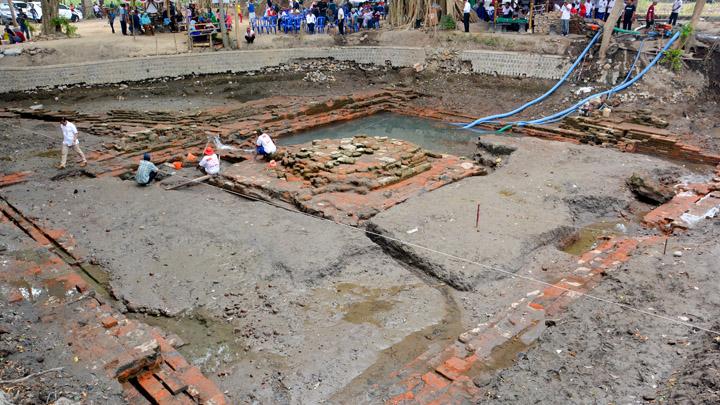
TEMPO.CO, Jakarta - Fires that consumed Riau`s estates and forests in 2014 have left behind some tough homework for restoring and managing the region`s natural resources. Several organizations have been moved to act. The Indonesia Climate Change Trust Fund (ICCTF) has devised a conservation strategy in response to the fires and the impacts of climate change in Riau, among other things by training the region’s women to manage the peatlands. The women are also trained to apply the biofloc system for cultivating catfish, to ensure better quality yields. Additionally, they are taught how to process their catfish into ready-to-eat food products, to improve the local economy. In July, a women’s group covering four administrative villages in Medang Kampai, Riau, celebrated their first catfish harvest. Tempo English reports.
Catfish Aquaculture on Peatland
A women’s group in the Medang Kampai subdistrict, Riau, are farming catfish with biofloc technology. Fern is used as feed.
THE 2014 forest fires in Riau have left Hidayah, 31, with some trauma. That year, people living in Pelintung, in the Medang Kampai subdistrict, city of Dumai, were trapped in the smog. Her child, then only five years old, suffered from an acute respiratory infection.
Hidayah could only take her daughter to the community health clinic once. "The roads were dark because of the haze, with a visibility of only 10 centimeters," she said.
According to the National Disaster Mitigation Agency (BNPB), the mid-2014 fires caused at least 49,591 individuals in Riau to suffer from coughs, runny nose, eye and skin irritation, breathing troubles, headaches and respiratory illnesses. At the time, the 137 points of fire throughout forest concession land planted with industrial plants-such as oil palm and trees were grown for pulp-caused the air quality to decline.
These conditions caused the majority of Riau residents to halt their activities, including Hidayah, who was teaching at the Darul Ulum State Islamic School in the Selinsing hamlet, Pelintung. Meanwhile, she received payment according to the time put into teaching. Neither could her husband go to work on their two-hectare oil palm estate. Because of the loss of earnings, they had to borrow money from a loan shark.
"We couldn’t work at all," said Hidayah, a native of Pekalongan, Central Java. "Our family’s finances were crippled for months."
Hidayah, who does not wish for the incident to repeat, eagerly welcomed the non-profit Riau Women Working Group’s (RWWG) invitation to take part in an effort to prevent fires in the region. The initiative was part of a program called Forest and Peatland Management for Reducing Emissions in Indonesia Through Local Activities (Tegak) by the Indonesia Climate Change Trust Fund (ICCTF). For this program, the ICCTF received £4 million in funding from the United Kingdom Climate Change Unit (UKCCU).
Medrilzan, director of environmental affairs at the National Development Planning Agency, says Tegak operated in five locations: Riau, Jambi, South Sumatra, as well as Central and West Kalimantan. But in Riau, Tegak paid special attention towards women-the group most impacted by climate change, said Medrilzam, which is why women’s involvement in managing and restoring peatlands is crucial.
"We want women to become leaders who can advance innovations to improve family welfare as well as restore peatlands," he said.
In the Pelintung municipal village, the RWWG and ICTF teach biofloc-based catfish aquaculture, using natural supplements for fish, to a women’s group called Bunga Desa (the village flowers) with 20 members. Hidayah is the group’s deputy chair.
Medrilzam explains that biofloc is environmentally friendly as it uses natural supplements for farmed fish, also resulting in catfish meat that is tastier and more tender. In Medang Kampai, Bunga Desa’s biofloc aquaculture makes use of a generally unwanted fern variety. Besides their abundance in peatlands around the residents’ homes, fern leaves are also rich in protein, which is good for the development of catfish.
Biofloc is not only environmentally friendly, the system also results in higher yields and is efficient in terms of land and water use, as it engineers the environment, relying on oxygen supplies and microorganisms to improve how catfish absorbs nutrients. "Most importantly, women can perform this type of aquaculture without having to travel far from home," said Medrilzam.























